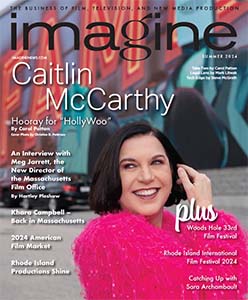 Yes! Every line that every character says is worth gold. You want to throw away precious minerals, you can, but if you think of all those words as priceless, perhaps it’ll help you quantify their value in your script.
Yes! Every line that every character says is worth gold. You want to throw away precious minerals, you can, but if you think of all those words as priceless, perhaps it’ll help you quantify their value in your script.
Screenwriters who come from the theatre – I’m one – have an intrinsic disadvantage, balanced, fortunately, by a practiced appreciation for the essential urgency of the spoken word. Downside: we can say, until we learn not to, too much; I had a producer tell me once that he dreaded first drafts from playwrights because every scene was nine pages long. See above – we learn. Theatre background upside: playwrights know that the only information our audience is going to glean, other than from the set and costumes, comes from dialogue.
In a movie you can show the protagonist waking up in his house – he’s rich, he’s poor, he’s a slob. You can show how he drives – he’s timid, he’s aggressive, he’s filled with road rage. You can show her at the gym – getting checked out by guys and hating it and filled with road rage of her own. You can show her making a lonely dinner for herself or a romantic one for her husband. You can show her, depending on what rating you want, making love cute (PG 13) or scissor kicking with her girlfriend (NC 17).
You don’t get those opportunities in the theatre. It’s why everyone at my Write On Golden Pond workshops creates a short play, to have no choice but to convey crucial details through what the characters say to one another, and to have nowhere to hide, no tracking shots, no sunsets, no scissor kicking close-ups.
In David Mamet’s AMERICAN BUFFALO, Teach’s first line is, “F**kin’ Ruthie, F**kin’ Ruthie!” That says a mouthful. Can you say that about your character? Will we know immediately his or her level of road rage? Will we hear the character’s intelligence, education, sadness, joy? Forget the expletives, how about exposition? How do we supply explanation without sounding pedantic? Good question. You want authentic dialogue; I say to my writers, go to the gas station. Stand in line at the supermarket. Go home. The world is full of characters and your family, I’m willing to bet, has its share. Mine sure does.
INT. LAST VIEW FUNERAL HOME – DAY
The phone rings in the silent catacomb. ARVID COUDERT, older than most of the bodies in the morgue, swallows the french fry he’s chomping down and answers.
ARVID
Last View. Your final wishes are our command.
A moment’s hesitation and then a voice, strained but strong.
THERON (V.O.)
Yes. I’d like to arrange a cremation.
They discuss prices and sizes of urns and the Red Sox, two crusty New Englanders, giving the writer ample opportunity to provide all of the above. Ending with:
ARVID
Okey, doke. If you could just tell me where the deceased is, we can begin the process.
THERON
You’re talking to him.
INTERCUT WITH:
INT. SUMMER COTTAGE – DAY
Cluttered and charming. With the lake glittering golden, THERON THOMPSON lies on a hospital bed, emaciated and old beyond his 70 years, so weak he can barely hold the phone, but determined.
THERON
You might want to hold off on the pickup.
Give me a few more days to get ready.
Right, that was my dad. In this writing exercise, I call him Theron because that was his name. Sometimes the painfully personal can help stir the embers. I’ve based other characters on his complicated biography and given them other titles, but what do we learn in those few lines? That he’s proud, he’s witty; he does’t want to spend a lot on a party he’s not going to be there for, but that he wants one more chance to have control. It’s the college professor equivalent of ‘F**kin’ Ruthie.’ A different sort of road rage.
We’ll use it in BEAUTIFUL WOMEN. We’ll give Margorie a similar scene, a last act of grace, a last display of stamina and generosity. One might ask, as I’ve been asked a few million times, how do you write characters so far removed from your own life experience? 28 when I wrote an 80-year-old man and it never occurred to me that there was anything unusual about it.
I’ve answered it a few million times, too: I take MY emotions, MY fear, MY joy, MY longing and losses, and graft them onto the character I’m developing, an old man, a lesbian, a high school co-ed. That’s MY voice you’re hearing, just as it should be YOURS in your characters. The fun is in the transference. How does your eccentric mother express the same frustrations you’ve known, or your pissed-off sister-in-law? The secret to great dialogue is that it’s the character’s life condition that dictates what he or she says, not the other away around.
I write dialogue that’s often a riot but I’m not a joke writer. You couldn’t take a line from, say, Norman Thayer and give it to Charlie the mailman; they’re not exchangeable one-liners. The humor comes from the pain; ask Moliere, ask Tennessee Williams, ask Mamet. The three guys in the first HANGOVER are funnier than they are in the sequels because we invest in how lost they are and not just because of the booze. You and I know what hurts for us; get to know your characters’ pain and you’ll know what they’ve got to say.
Come to a workshop at Whitebridge Farm and you’ll see. It really will have been something you said that will elicit laughter and touch hearts and inspire your audience.
Ernest Thompson, an actor, director and the author of more than thirty screenplays, including the classic ON GOLDEN POND, for which he won an Oscar, a Golden Globe and a Writers Guild Award, offers private coaching and script analysis (ad page 30), weekend workshops at his farm in New Hampshire, and also teaches advanced acting classes in Boston and elsewhere. For more information, visit www.ErnestThompson.us.




